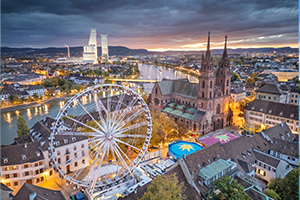


Switzerland
Switzerland, nestled in the heart of Europe, is renowned for its picturesque landscapes and strategic location. Bordered by Germany, France, Italy, Austria, and Liechtenstein, this landlocked country uniquely blends German, French, and Italian cultures, reflected in its four official languages. With their breathtaking peaks and pristine lakes, the Swiss Alps draw tourists year-round for activities ranging from skiing and snowboarding to hiking and mountaineering.
Due to its diverse topography, Switzerland’s climate varies significantly. In the lower regions, the country enjoys a temperate climate with mild winters and warm summers. Conversely, the higher altitudes experience harsh winters with heavy snowfall, making Switzerland a paradise for winter sports enthusiasts. The southern region of Ticino even boasts a Mediterranean-like climate, where palm trees thrive along the shores of Lake Maggiore.
Switzerland is globally renowned for several key features, including its robust economy, exceptional quality of life, and political neutrality. The country is a financial powerhouse, home to some of the world’s largest banks and financial institutions, and boasts a high GDP per capita. Swiss watches and chocolates are synonymous with precision and luxury, reflecting the country’s unwavering commitment to excellence. Additionally, Switzerland’s strong economy is underpinned by sectors such as pharmaceuticals, machinery, and tourism, making it one of the most prosperous nations in the world.
Visa Eligibility, Types and Process
Visa Eligibility
Switzerland’s job market is highly attractive and known for its stability, competitive salaries, and excellent working conditions. The country has a high demand for skilled professionals in various sectors, including finance, pharmaceuticals, information technology, engineering, and healthcare. However, navigating the work visa process is crucial for non-EU/EFTA citizens aspiring to work in Switzerland.
As a non-EU/EFTA citizen, you can apply for a Switzerland work visa if you fulfil the following criteria:
- You are a skilled and qualified worker (manager, specialist) with a university degree, significant work experience, and specialised expertise.
- You have secured a job offer in Switzerland.
- No EU/EFTA citizens are available to fill the job position.
- The annual quotas for Swiss work visas permit it.
If you meet these criteria and your employer is applying for your residence permit, you can apply for your Swiss work and resident permits. Since January 1, 2021, UK nationals are no longer considered EU citizens and are subject to the same regulations and quotas as other third-country nationals.
Application Process
Step 1: Find a Job in Switzerland
- Job Offer: Before applying for a Swiss work visa, you need a job offer.
- Recruitment Agencies: International or local recruitment agencies can be used to find suitable job openings.
- Online Job Listings: Explore job listings online.
Step 2: Prepare Your Swiss Work Visa Documents
- Visa Application: Make an appointment at your country’s Swiss embassy/consulate.
- Document Submission: Submit your documents in triplicate and pay a non-refundable visa fee.
- Required Documents:
- Three completed long-stay visa application forms (in German, French, Italian, Spanish, or English).
- Valid passport with at least two blank pages.
- Three copies of relevant passport pages.
- Four recent biometric passport-sized photos.
- Job contract and two copies.
- Proof of professional activity.
- Copies of qualifications (diplomas, certificates, etc.).
- Previous education details.
- Evidence of job search efforts.
- Translations for documents not in German, French, Italian, or English.
Step 3: Apply for the Work Visa
- Employer’s Role: Your employer applies for your residence permit with the local cantonal employment services.
- Cantonal Review: The cantonal authorities review your application and refer it to the Federal Office for Migration (FOM) for approval.
- Residence Permit: If approved, you will receive a residence permit that will allow you to work.
- Visa Issuance: Apply for a Swiss work visa at your country’s embassy or consulate.
Enter Switzerland: Upon receiving your visa, enter Switzerland and register at the Residents’ Registry Office within 14 days to get your residence permit.
Visa Types
In Switzerland, work and residence permits are unified, as you can only work in the country with a residence permit. Your future employer is responsible for obtaining a work permit from the cantonal immigration and employment market authorities. If you are self-employed, you must take the necessary steps to secure the permit.
Four types of permits enable foreign nationals to live and work in Switzerland:
Temporary Stay Visa
For short-term work assignments up to one year.
Residence Visa for Work Purposes
For long-term employment with a Portuguese company.
Highly Qualified Activity Visa
For professionals with specialized skills and higher education qualifications.
Research Visa
For researchers and academics with a job offer from a research institution in Portugal.
Startup Visa
For entrepreneurs who intend to establish an innovative business in Portugal.
EU Blue Card
For highly skilled non-EU professionals with a job offer in Portugal, meeting specific salary and qualification requirements.
Visa Fees
Sweden’s work visa fees vary based on the type of permit and the applicant’s circumstances. Here’s a summary of the key costs:
L Permit:
- A short-term permit valid for up to one year.
- Can be renewed or extended depending on the employment contract.
B Permit:
- Valid for one year.
- Renewable annually as long as the holder remains with the same employer in the same canton.
C Permit:
- Also known as a settlement permit.
- Granted after living and working continuously in Switzerland for 10 years (five years for US or Canadian citizens).
G Permit:
- For cross-border commuters from another EU/EFTA country.
- Requires holders to return to their main residence at least once weekly.
Benefits of Working in Switzerland
01
High Salaries: Switzerland offers some of the highest salaries globally, especially in finance, pharmaceuticals, and engineering.
02
Excellent Work-Life Balance: Swiss employees typically enjoy a standard 40-hour workweek and generous vacation allowances, promoting an excellent work-life balance.
03
High Quality of Life: The country consistently ranks high in global quality of life indices due to its clean environment, excellent healthcare, and low crime rates.
04
Strong Economy: Switzerland has a robust and stable economy, providing job security and numerous employment opportunities.
05
Multicultural Environment: Home to many multinational companies, Switzerland has a diverse workforce and offers a rich cultural experience.
06
Comprehensive Social Benefits: Employees receive extensive social security benefits, including health insurance, unemployment benefits, and pensions.
07
Excellent Healthcare System: Switzerland's healthcare system is renowned for its high quality and accessibility.
08
World-Class Education: The country offers excellent educational opportunities with many international schools and universities, ideal for employees with families.
09
Career Development Opportunities: Numerous professional growth and development opportunities exist, including training programs and work with leading companies and institutions.
10
Central Location: Situated in the heart of Europe, Switzerland provides easy access to major cities and countries, enhancing business and travel opportunities.
11
Safety and Political Stability: Switzerland is known for its political neutrality and stability, which makes it a safe and secure environment for residents.
12
Tax Benefits: Despite the high cost of living, Switzerland's tax system is relatively favourable, with lower income tax rates than many other European countries.
Conclusion
Working in Switzerland offers numerous benefits, including high salaries, excellent work-life balance, and a high quality of life supported by a strong economy and a multicultural environment. It is important to note that health insurance is compulsory and must be obtained within three months of arrival. Employers are required to provide accident insurance for those working over eight hours a week.
Foreign workers can enjoy a range of social benefits and professional development opportunities. After ten years of continuous residence, individuals can apply for permanent residence, which offers greater stability. Eventually, this can lead to Swiss citizenship, allowing for long-term integration and security. Switzerland’s favourable tax system, excellent healthcare, world-class education, and political stability make it an ideal destination for skilled professionals seeking career growth and a high standard of living.
